Matt Rees's Blog - Posts Tagged "israelis"
My book shtick in full
At the Jerusalem Book Week, I gave a talk about how I came to write my Palestinian crime series. With the discussion afterward, it ends up being over an hour long, including some talk about crime novels, the Middle East, politics and my personal history. Watch it ,here
Live at the Leipzig Book Festival!
On my recent tour of Germany, I was interviewed (in English) on the 3Sat tv channel's stage at the Leipzig Book Fair. Of the big Germany book festivals, this is the one that gives the most time to readers and authors (the biggest, Frankfurt, is mainly for publishers to get a little more than tipsy together -- oh and to do some deals, of course). I was interviewed by a lovely, knowledgable German journalist named Tina Mendelsohn about my second Palestinian crime novel A Grave in Gaza, which is just out in German and proving very successful there. It was a bit of a demanding situation to maintain concentration, with thousands of people wandering by me only a few yards away -- many of them dressed rather disconcertingly as Japanese cartoon characters...But it was fun, too.
The right Holy Land, the wrong Holy Father
My irreverent take on the arrival of Pope Benedict XVI to the Holy Land features prominently on The Daily Beast today. Maybe people always say their take is "irreverent," but in the case of a story about the Pope I feel justified in using it...
Python mistakes Palestinians for Buddhists
Last week at the Palestine Literature Festival, Michael Palin produced some of his funniest material since his Monty Python heyday. However, he probably didn’t intend it to be funny.
Palin told an audience that was rather lacking in actual Palestinians – mainly locally based international aid workers, diplomats and heaven knows who else – that he had seen how Israeli checkpoints worked. He thought it’d be a good idea to “always look on the bright side of life” and see the checkpoints as an opportunity for Palestinians to slow down. It saves them, he suggested, from the kind of frenetic pace that drives people crazy in other places, where there are no checkpoints.
A few attendees were perturbed by Palin’s comments. After all, the point of the checkpoints is less to slow down Palestinians and, more frequently, to prevent them moving about at all. Still he got off lightly. In Palestine, everybody expects the Spanish Inquisition…
I think Palin’s remarks were delightful. He’s trying to find something good about an aspect of life which most people only see as wicked and frustrating. Always look on the bright side of life, right?
It’s not his fault if he mistook the Palestinians for Buddhists.
Palin told an audience that was rather lacking in actual Palestinians – mainly locally based international aid workers, diplomats and heaven knows who else – that he had seen how Israeli checkpoints worked. He thought it’d be a good idea to “always look on the bright side of life” and see the checkpoints as an opportunity for Palestinians to slow down. It saves them, he suggested, from the kind of frenetic pace that drives people crazy in other places, where there are no checkpoints.
A few attendees were perturbed by Palin’s comments. After all, the point of the checkpoints is less to slow down Palestinians and, more frequently, to prevent them moving about at all. Still he got off lightly. In Palestine, everybody expects the Spanish Inquisition…
I think Palin’s remarks were delightful. He’s trying to find something good about an aspect of life which most people only see as wicked and frustrating. Always look on the bright side of life, right?
It’s not his fault if he mistook the Palestinians for Buddhists.
Published on June 04, 2009 07:04
•
Tags:
checkpoints, israel, israelis, literature, michael, monty, palestine, palestinians, palin, python
Writer is pro-Palestinian and pro-Israeli
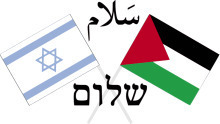 The best thing about moving from journalism to fiction writing is that people show you more respect.
The best thing about moving from journalism to fiction writing is that people show you more respect.As a journalist covering a troubling issue like the Israel-Palestinian conflict, I was often subject to rather nasty verbal attacks during public speaking engagements. For a partisan of either side, I seemed a fine target for their generalized contempt—they thought journalists were all against them and here was a live reporter on whom they could vent their spleen.
Thankfully that doesn’t happen now that I’m the author of a series of Palestinian crime novels. I wasn’t sure that it would be different, but it turns out that there’s a big change in the way people behave toward me.
Here are two examples from the last week alone.
In Cologne, Germany, last week, I talked in a bookstore at the invitation of the Cologne-Bethlehem Association. Much of the audience was made up of middle-aged and older Germans who visit Bethlehem frequently and have made strong ties with the people there.
One older gentleman suggested that, because my first novel THE COLLABORATOR OF BETHLEHEM shows the corruption and extortion carried out by the gunmen of the town during the intifada, my book “tended toward Israeli propaganda.”
But the old fellow was very respectful and as I answered him I could tell he was listening. (My response, of course, is along the lines of “No, actually the book doesn’t even address whether or not it’s right to shoot at Israelis; the book concerns itself with the negative effect those gunmen had WITHIN Palestinian society.”) Listening’s something that was often evidently not happening when, as a journalist, I would talk to audiences.
Then this week I went to the Israeli settlement of Efrat in the West Bank. I’ve visited many times before to write news reports about the confiscation of land or the endless pressure from Washington to stop building in the settlements. This time I was invited by the Gush Etzion Book Group, a few dozen women who live in the local settlements.
There had been quite some fiery debate within the group about whether to have me come and speak to them. Indeed, someone hinted that certain members of the group had stayed away.
Nonetheless, I was glad to be there. After all, much of THE COLLABORATOR OF BETHLEHEM takes place in the village of Artas and the Dehaisha Refugee Camp, which abut the northern reaches of Efrat. I want very much to talk about my books with people who have a stake in the Israeli-Palestinian struggle. Provided they’re willing to listen respectfully, to examine what I’m actually saying and not what they think I’m saying (or what they wish I’d say.)
The evening in Efrat went well and, in fact, much of what we talked about was how little I’m interested in politics—despite the apparently political subject-matter of my novels. What interests me is “the life that remains when politics is sluiced away like the filth a stray dog leaves in the street” (that’s a line from my sleuth Omar Yussef in THE FOURTH ASSASSIN, the next of my novels, which will be published Feb. 1).
Such respectful treatment is a big contrast to situations I encountered as a journalist. Then I would look out over audiences which seemed to be entirely red-faced and with arms crossed over every chest. The hostlie body language didn’t change, even though I was essentially saying the same things I’m saying now. Partisans hate journalists and, I believe, many of them used somehow to detest that I had found a kind of personal peace in covering the very conflict that stirs them up and stresses them so.
In Cologne and Efrat, people heard what I had to say and understood that I’m pro-Palestinian and pro-Israeli. I'd like all the people I know here to have a good life, not the violent situation they suffer. Politics makes people choose sides, and I want no part of that.
I also think choosing sides makes for rather bad novels. It’s in the shades of gray, where decisions are so difficult or even impossible to make, that a novel becomes truly compelling--think of Graham Greene’s best novels. Political journalism on the other hand is, to say the least, dreary. Think of the glib rubbish turned out by columnists who have to fill three op-ed spaces each week.
Who would you respect more—Graham Greene or G. Gordon Liddy? See what I mean?
So I’ll continue to talk about my books to anyone who’ll take the time to read them, because that in itself is a sign of respect and openness. Those, after all, are the qualities most needed by both sides of the Israeli-Palestinian conflict if they’re ever to find peace.
(I posted this first on a joint blog I write with some other international crime writers.)
Published on January 14, 2010 23:21
•
Tags:
bethlehem, book-groups, cologne, crime-fiction, efrat, fiction, g-gordon-liddy, graham-greene, gush-etzion, international-crime-authors-blog, israel, israelis, journalism, koeln, matt-beynon-rees, mystery-novels, omar-yussef, palestine, palestinians, politics, settlements, settlers, the-collaborator-of-bethlehem, the-fourth-assassin, west-bank
Everyone comes back to Jerusalem
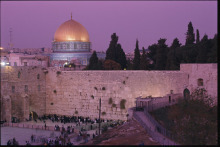 Everyone comes back to Jerusalem. I don’t know why, for the life of me I really don’t.
Everyone comes back to Jerusalem. I don’t know why, for the life of me I really don’t.It’s much too hot. The people can be offhandedly mean, and they drive as though they want to kill you. It isn’t a very pretty place once you look close. Oh and, yes, sometimes it gets violent. With jaw-dropping self-obsession, it thinks the eyes of the world are turned admiringly upon it all the time.
Jerusalem sometimes seems like that inexplicably popular idiot everyone liked in high school. Exerting a stupefying magnetism over people with otherwise solid judgment.
I’ve been in Jerusalem 14 years. I’m under no illusions as to what keeps me here. I’ve made a good life for myself with good friends, and the place provides me with the material for my writing.
But I’m rather immune to its other supposed charms. It’s no Tuscany.
Yet all my journalist pals have come and gone – and come back again. I’ve been here so long, everyone to whom I’ve said goodbye ends up dropping in for dinner once more. It wouldn’t happen if I went back to live in Wales. No one is drawn there with idealistic visions of its sublimity…
I spoke to a writing group in the center of Jerusalem last week. Lovely people the lot of them. Mostly young Americans or Canadians, Brits and South Africans who’ve immigrated recently to Israel and want to get together with writers of a similar background. All of them so devoted to Jerusalem.
To some degree, each of them has to live here a while to see beyond the newness. They’re experiencing the same happiness I recall when I arrived at university and discovered a kind of freedom and belonging I’d only before imagined. Until then, they’ll write about Jerusalem in the tones of the biblical psalmist, making of the city a personified lover, the object of desire and devotion.
That isn’t how I see the place. I’ve lived through an intifada, seen Jerusalem mangle the bodies of its peoples and accept the spray of hateful slogans on its walls. I’ve been called all kinds of names by all kinds of people and sued by some particularly unreasonable ones. I’ve come close to being run down on crosswalks by angry Israeli drivers and shoved aside in the Old City by angry hashish-raddled Palestinians.
For a while all that made me angry too. Not so angry that it overcame the feelings of creativity it gave me. There’s a certain anger – spun forward and made pro-active, positive – at the heart of Omar Yussef, the hero of my Palestinian crime novels.
Why didn't I keep on getting angry? Because I discovered I liked the hash-tokers of the Muslim Quarter rather better than I enjoyed the company of the politicians or professional classes I met as a journalist.
That’s one of the main reasons I write crime novels about this place. Crime novels are the opposite of idealization. They see “the skull beneath the skin,” as Eliot wrote of John Webster (a playwright I recommend to anyone who likes a bit of morbid, cynical straight-talk).
It isn’t that I take a negative view of Jerusalem and its environs. I long ago realized that I continue to live here because there’s something I like about it, and its people. Just not in a romanticized way. It’s simply because I’ve come to understand the ways in which the people and their city push each other to the edge of existence. It’s when they’re on the edge that I find out what really counts for them.
And for me.
(I posted this today on International Crime Authors, a joint blog I do with some other...well, crime authors, obviously.)
Published on January 21, 2010 01:36
•
Tags:
arabs, bible, crime-fiction, islam, israel, israelis, jerusalem, jews, journalism, muslims, palestine, palestinians, psalms, writing
Back to Israel: Recall what's foreign
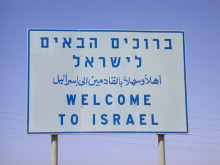 When you live in a foreign place, it can become home. You forget how foreign it is.
When you live in a foreign place, it can become home. You forget how foreign it is.Then you go to another foreign country, only to discover that it doesn’t seem so foreign. And you realize that the place you live actually IS extremely foreign.
That’s what happened to me during the last week, when I toured Germany to read from my third Palestinian rime novel THE SAMARITAN’S SECRET (just published by CH Beck Verlag as “Der Tote von Nablus.”)
I was in Munich station when I noticed in a pastry shop that Germans spell pretzel with a B (“Brezel”). I felt a little blown away, as though I’d been living a lie all these years offering my son “pretzels.” But that’s as foreign as Germany got. Otherwise, this Welshman felt right at home there.
Right off the plane on my return to Israel, however, the country which has been my home since 1996 and where I’ve grown accustomed to the way people behave, the foreignness hit me anew.
Actually even before that. The fellow in the seat next to me on the flight from Frankfurt kept talking to me – Israelis have a way of talking a lot and they can also be rather clueless about my oh-so-subtle signals that I’d rather read my book. While I was eating, he reached over and took part of my bread roll with a smile and gentle touch of my forearm. (Bread is something you share in Middle Eastern meals, although it usually applies to pita and flatbread, not to tiny airline rolls. This was pretty extreme space-invasion, even for a Middle Easterner, but the reassuring friendly gestures while he was taking advantage of me were very familiar.)
Then in the airport, the dimensions of personal space shrank from the yard kept by Germans to an elbow-brushing, back-nudging Middle Eastern minimum. I smiled, because the Tel Aviv airport is very flashy and new – you could be anywhere in the world. But it’s most definitely not the unflustered calm of Dresden airport, where I boarded my first flight of the day.
Arrival in a “foreign” country means a lot of things that’ll sound deeply negative – or at least they’ll sound like I’m being negative. The shoving and noise and the passport lines where people don’t actually wait in line but prefer to edge around you. But I’m not entirely negative about them. I like it (mostly), because I enjoy being an outsider. To be sure, I don’t think I’d like it much if I looked around and thought, “These are my people. This is my culture. This is ME.”
Then, I expect I’d want us to be more organized, more respectful of each other, less suspicious, more…foreign.
As I emerged into the humidity of the plains between Tel Aviv and the Judean Hills, it struck me that “foreign” countries are simply the ones where things aren’t even remotely fair. That’s why everyone at the Tel Aviv airport hovers over the baggage carousel, shifting from foot to foot, edging in front of others closer to the bags. It suggests an absolute fear that the bag never will come and, most of all, that if all the bags happened to arrive all at once you must be the first one to grab yours and get away before the other suckers. Life in a “foreign” country is a zero-sum game, in which someone else’s success or happiness comes somehow at your expense and must be envied, hated, usurped.
That’s not a German quality. Germans have a sense that there’s some degree of fairness in their society and it makes relations between them less devious and Machiavellian, less on the make. They drive fast, but they don’t think someone else driving fast is attacking them on a macho level, signaling superiority and disdain for them, and, thus, respond by semi-subliminally trying to run them off the road.
So here I am, back in Jerusalem, back to being a foreigner.
Though I shouldn’t forget that at least Israelis spell pretzel with a P.
(I posted this on International Crime Authors Reality Check, a joint blog I do with some other crime writers. Check it out.)
Published on March 25, 2010 07:35
•
Tags:
blogs, crime-fiction, der-tote-von-nablus, dresden, frankfurt, germany, israel, israelis, jerusalem, middle-east, munich, tel-aviv, the-samaritan-s-secret
The war Israelis and Palestinians plan
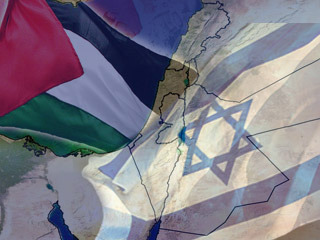 I posted this on Global Post. JERUSALEM — There’s an old Arab aphorism: “A man with a plan takes action; a man with two plans gets confused.” Apply that to the Israelis and to the Palestinians, and the nonsensical sequence of recent events in the Middle East starts to fall into a comprehensible pattern.
I posted this on Global Post. JERUSALEM — There’s an old Arab aphorism: “A man with a plan takes action; a man with two plans gets confused.” Apply that to the Israelis and to the Palestinians, and the nonsensical sequence of recent events in the Middle East starts to fall into a comprehensible pattern.It’s not a pleasant pattern, because it leads to war.
First, before we get to the fireworks, let’s recap all the nonsense.
The Palestinians refused to talk to the Israelis from December 2008, when a relatively centrist Israeli government made a peace offer the Palestinians rejected. Since then, small economic reforms and big U.S. security aid have made life in the West Bank fairly free of violence. Better, for sure, than life in Gaza, which is still a mess more than a year after the Hamas-Israel war there.
Israelis elected a center-right-dominated parliament a year ago, and Benjamin Netanyahu formed a rightist cabinet. He refused to halt building in Israel’s West Bank settlements, as President Barack Obama demanded. Even when forced by Washington to put a transparently fake freeze on construction he declined to include East Jerusalem.
The Palestinians wouldn’t restart direct peace talks until there was a freeze on the Israeli neighborhoods of East Jerusalem. So the Americans eventually persuaded them to have indirect talks. Without much enthusiasm, the Palestinians agreed.
Why no enthusiasm? Leading Palestinians, including chief negotiator Saeb Erekat, had already started to talk about a new failed round of talks leading quite simply to a “one-state solution.” That means, no division of the land, just a single state in what’s now Israel, the West Bank and Gaza. One adult, one vote. Soon enough, of course, that means no Jewish majority and the end of Israel as a Jewish state.
Meanwhile, Israel largely escaped the financial crisis of the last two years and its citizens spend little time fretting about the Palestinians. In Tel Aviv, the discovery of old bones by workers building an underground emergency room for a hospital led last month to an attempt by ultra-religious politicians to block the construction, and protests by locals who cried out against religious coercion.
No such mass protests against continued building in the settlements. That proceeds, even to the extent that during the last month announcements of new construction in East Jerusalem have caused a major crisis in relations with Washington. In one case, the planned building of a mere 20 apartments in an Arab neighborhood of East Jerusalem forced Obama to take time out of his undoubtedly busy day to discuss it with Netanyahu.
There’s more nonsense, but let this much suffice for now.
Back to the Arab aphorism. Who has a plan, and who’s confused?
It’s clear that most Israelis and most Palestinians are living in denial — a kind of confusion, because it takes the illusion of current calm for a sustainable and welcome period of peace.
Israelis know the settlements can’t go alongside a two-state solution, but they don’t choose one or the other.
Palestinians know that the way to stop the settlements eating up the hilltops around their towns is to strike a deal now and rule their own state, but they won’t do it so long as life is relatively good and the international pressure is all on Israel. Leaders of Fatah and Hamas have called for a “third intifada” several times in the last four months — not for renewed talks, only for renewed violence. But a mere handful of kids came out to throw rocks and Molotov cocktails.
With no sense of urgency on either side, Western diplomats shake their heads and try to nudge the two nations to the negotiating table. It’s time to realize that neither side wants talks.
While most Israelis live in denial, a sizeable minority pushes for more building in the West Bank and East Jerusalem. They’re not building so that they can later give up that land and see all the money they’ve pumped into their real estate wasted. The purpose is to make the West Bank inseparable from Israel. To kill the two-state solution.
In that scenario, either the Palestinians agree to be second-class inhabitants of the area -- fat chance -- or they leave. Well, with a little nudge.
On the Palestinian side, negotiations seem unlikely to lead to the satisfaction of every single demand. So the one-state solution starts to look good to them, too. However, second-class citizenship isn’t an option, and neither is leaving.
That’s the collision course Western diplomats refuse to countenance. When envoys talk about getting the “peace process on track,” it sounds good. But that process has been trucking along since the early 1990s. Peace has been getting further away. The “process” allows for a sense of activity, while all the time events — settlement construction, terror attacks — make it harder to draw lines on a map and make the populations secure.
It’s time to figure out a new diplomatic strategy to deal with the Israelis and Palestinians. One that’s based on the assumption that, in the longterm, they’re expecting war.
Published on April 06, 2010 02:02
•
Tags:
arab, barack-obama, benjamin-netanyahu, conflict, crime-fiction, east-jerusalem, fatah, gaza, global-post, hamas, intifada, islam, israel, israelis, jerusalem, jews, journalism, middle-east, palestine, palestinians, settlements, tel-aviv, war
Bibi's Bedtime Book: The Secret Diary of Prime Minister Netanyahu
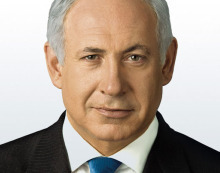 No Palestinian state this week. Don’t really know why not. At this point I’d be happy to sign off on anything at all, just to get it off my hands. I’ve told the Americans that, but they seem convinced I’m some kind of hardliner—they think I’m bluffing when I say “Barry, where do I sign?” I think it’s because of the way I lift my eyebrow in my official photograph. I thought it was sexy and devil-may-care, but apparently it makes me look hawkish and too clever for my own good.
No Palestinian state this week. Don’t really know why not. At this point I’d be happy to sign off on anything at all, just to get it off my hands. I’ve told the Americans that, but they seem convinced I’m some kind of hardliner—they think I’m bluffing when I say “Barry, where do I sign?” I think it’s because of the way I lift my eyebrow in my official photograph. I thought it was sexy and devil-may-care, but apparently it makes me look hawkish and too clever for my own good.It’s been Passover here in Israel. I’ve had to smile and shovel down the usual seasonal foods. I even had to sit through a seder. We were slaves in Egypt, etc., on and on for six hours. You’d have thought we’d be done with all that now. It’s like Zionism never happened.
I gather they had a seder at the White House, too. Without me. Maybe I’ll have Kwanzaa at my villa in Caesarea this year and I pointedly won’t invite Obama. On second thoughts, the rabbis wouldn’t like it. They don’t like holidays where you sing in tune – strictly tuneless, out of time, Jewish mumble-singing is more their thing.
I went down to Shaul’s Shawarma stand to mix with the people. Mofaz insists on meeting there – he set the place up as something to fall back on if he doesn’t get to be Prime Minister instead of me; he could retire, stop wearing his colorless rep ties, and instead bore all his customers with stories of how his political career was a victim of the Ashkenazi establishment. He served me some kind of stinking horsemeat impacted under high pressure into a block so that it looked like an actual cut of meat. I called him “my brother,” which is how Israelis who aren't from the Ashkenazi elite like to refer to each other, and went off to find a breath mint. I suppose he thought the joke was on me.
I’ll eat anything, provided someone else is paying, of course. That’s why I got into politics. Even when I wasn’t in office, at the end of a meal, I’d pat my jacket and say, “Sara, did you bring my wallet?” And some guy from Los Angeles would always reach out and say, “No, no, Mister Prime Minister, let me.”
Why do they say “Mister Prime Minister?” Or Mister President? These are nouns, aren’t they? You don’t call the man who fixes your toilet “Mister Plumber.” On the occasions when I’ve met this Rees fellow I didn’t call him “Mister Writer.” It’s not even necessary for my wife to call me “Mister Big Shot” when she’s upset with me. “Big Shot” would do. I suppose “Mister” adds a grace note to her sarcasm.
Mainly such things are all about self-aggrandizement. Still, just so long as they pick up the tab for my steak and lobster, I’ll let it slide.
Talking of self-aggrandizement, Defense Minister Napoleon puffed out his little chest and humiliated the head of the army this week. Something silly to do with not extending the chief of staff’s term because he didn’t kiss up (figuratively, because in reality everybody would have to bend down to kiss that shortass). Perhaps he’d neglected to call him “Mister Defense Minister.” Or “Mister Bonaparte.” Or “My Emperor.”
Anyway, someone else’s troubles are usually a sign that someone’s too busy elsewhere to ruin my week. So it’s good news. I’ve barely been in the headlines all Passover.
Why am I shy of the press? I keep getting slated for being a hardliner, that’s why. Yet it’s little Napoleon who flattened Gaza and ballsed up the “peace process” a decade ago. I thought we were rid of him once he got onto the $50,000 a night speaking tour in the US. I suppose he had to come back for a while to keep in the public eye, then in a few years he can be President, which isn’t a real job (though I haven’t told Peres that.)
No, I don’t understand the press. Take that fellow Matt Beynon Rees. He came to my office a while back and smoked one of my long Cubans. I told him about my interpretation of the work of Emmanuel Kant, but all he wrote about in the end was a few things I’d said about building in our settlements in Judea and Samaria.
I gather Rees also concluded that journalism is a waste of time. He’s writing fiction now. Crime novels about a Palestinian detective. I must take a look at them. I gather my pal Arafat doesn’t come out too well in one of them called “The Samaritan’s Secret”. A shame. I’m rather fond of the sneaky old “ra’is”, of blessed memory.
Maybe I’ll give it all up and write some fiction myself. About an Israeli Prime Minister who’s misunderstood, who only wants to make people happy and give everyone he talks to exactly what they want. A state for the Palestinians. More ritual baths for the ultra-Orthodox. A free Mazda for the 6 percent of Israelis who don’t already own one. The Legion d’Honneur for the Imperial Defense Minister.
Yes, I might just write a book like that. I think it’d be a good read.
But no one would believe it.
[Prime Minister Netanyahu will be continuing to disclose his most secret thoughts exclusively on this blog].
Published on April 08, 2010 01:12
•
Tags:
barack-obama, benjamin-netanyahu, bibi-s-bedtime-book, crime-fiction, ehud-barak, israel, israeli-politics, israelis, matt-rees, palestine, palestinians, shaul-mofaz, the-samaritan-s-secret
Israel prepares for next threat--nuclear?
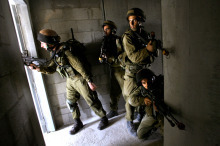 NABLUS, West Bank — During the Palestinian intifada, I sat on a dusty hilltop overlooking this most violent of West Bank towns with a dozen of the top Israeli officers in the area. The brigade commanders told their regional chiefs that all the police work and house-to-house fighting of the intifada had made their troops ill-prepared for a real war. “If we had to fight in Lebanon, my men wouldn’t know what they were doing,” shouted one.
NABLUS, West Bank — During the Palestinian intifada, I sat on a dusty hilltop overlooking this most violent of West Bank towns with a dozen of the top Israeli officers in the area. The brigade commanders told their regional chiefs that all the police work and house-to-house fighting of the intifada had made their troops ill-prepared for a real war. “If we had to fight in Lebanon, my men wouldn’t know what they were doing,” shouted one.In 2006, that prediction was proven largely true, as Israeli forces were matched on the ground by Hezbollah’s militia. The air- and missile-warfare that went on over their heads was devastating to Lebanese and Israeli civilians, but Israel’s military planners were shocked by the difficulties faced by their ground troops.
For Israel, the threat these days is clear. Nablus is quiet, its gunmen subdued by Palestinian police who are trained with American help and the economy bolstered by American aid. This week, Israeli soldiers will run through a series of exercises to practice for a potential conflict with Hezbollah on the country’s northern border.
The main unknown in those exercises: How long does Israel have before the threat of nuclear attack will come into play?
Israeli government officials and security chiefs are reluctant to talk about how Israel might respond if Iran succeeds in obtaining nuclear weapons. They prefer to emphasize the destabilization of the international balance of power should such a situation arise. “We should focus on prevention,” Intelligence Minister Dan Meridor told international journalists last week. “Prophylactics, rather than dealing with unwanted results.”
So the disdain in Jerusalem was absolute for the Turkish-Brazilian deal announced last week under which Iran would ship some of its uranium to Turkey. To use Meridor’s biological analogy, that was about as much use as a prophylactic with a big hole in it. The Iranians were playing for time, Israeli officials said, and the United States was right to override the deal and go for strong sanctions.
Trouble is, most Israeli officials don’t expect those sanctions to work any more. Israel is starting to come to terms with a burgeoning Middle Eastern nuclear arms race. It will start the race with a lead — it has had nuclear weapons for four decades. But with Iran coming up on the rails and Saudi Arabia and Egypt, unwilling to be potentially threatened by Tehran, soon joining the competition, the dangers to the Jewish state are considerable.
It’s de rigueur for international strategists to say that Israel isn’t the country that should be most worried by Iranian nuclear ambitions. Instead, they posit the Gulf states, Shia Iran’s Sunni Muslim rivals, as the most at-risk.
There’s something to that. Yet Iran’s biggest success in exporting Islamic Revolution has been through Hezbollah in Lebanon. It also now has a direct line to Gaza with Hamas, which it helps to bankroll. Both would be easy places from which to use nuclear capability to influence regional — or even world — events.
Israel’s response to the Iranian move toward nukes is complicated. Its actions are limited. A potential aerial attack on Iran’s nuclear facilities would be difficult without bunker-buster bombs or coordination with the U.S. and the Arab countries over which Israeli jets would have to fly.
Diplomatically, Israel has little faith that sanctions can do anything more than delay an Iranian bomb. Why? Because it has experience of its own in negotiating about an issue so long that its negotiating partner in the end accepts a sliver of what it had originally asked for — and even then the negotiations can start again without reference to previous deals.
That’s a familiar tactic in Jerusalem, which has frequently confounded Western negotiators. Just as Iran has infuriated Washington with the sanctions issue, agreeing to something when total breakdown seemed imminent and pulling back just before it was required to act.
In public, at least, Israeli officials are forced to push for stiff sanctions, as if they thought that'd make a difference. But rather than believing Iran’s nuclear program will be ended, they view the sanctions as a way of buying time for Israel to prepare its troops exercises like those this week and to ready more advanced missile defenses.
Congress this week voted for President Barack Obama’s plan to give $205 million to Israel to fund its short-range missile defense system. That’s vital to Israel now, given Hamas’ rockets in Gaza, which have Tel Aviv in range, and Hezbollah’s ability to hit any place in Israel with some of its 42,000 missile arsenal. But it will only be more important once the equation has a nuclear component.
(I posted this on Global Post.)
Published on May 23, 2010 01:46
•
Tags:
brazil, crime-fiction, dan-meridor, gaza, global-post, hamas, hezbollah, iran, israel, israeli-army, israelis, jerusalem, journalism, lebanon, middle-east, nablus, nuclear-weapons, palestine, palestinians, tehran, turkey, west-bank



